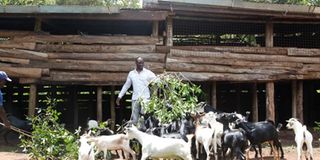Prime
Do away with animal stench

Mathew Nabwiso feeding his goats at his farm. Photo by Rachel Mabala
What you need to know:
Rearing animals can be a menace in your compound, especially if you have a small plot of land. This is because it may cause a permanent stench in your compound. Racheal Irene Nalubega takes us through how one can keep away the stench.
A private residence is every one’s dream place of abode. Here, you get to do what you want without interfering with other people’s space.
Lately, some people with private houses indulge in domestic animal rearing on their premises.
Due to space constraints, most of it is on a small scale while others do it on a large scale.
However, this comes with the hustle of making sure you not only keep the animal shelter clean but also stench-free since these animals are part of your home. Below is how you can keep clean.
Cleaning livestock shelter
Animal shelter needs to be cleaned twice a day given their uncontrollable waste nature.
Animals are not trained on when and where to properlydispose off their waste so it is up to their owner to ensure that the place is cleaned frequently.
This will not only prevent infections in your home but also make sure animals are pleasant to have around your home.
Also, since infections are easily picked up from animal shelters, Masitula Nalweyiso a freelance exterior designer says it would be wise to once in a while use disinfectants such as jik to clean. This will guard your family from getting infections.
Different animals have different challenges because they feed and excrete differently. Persis Namugenyi, a small scale pig farmer from Kisaasi, an outskirt of Kampala says rearing animals such as pigs come with difficulty especially since they are well known for their dirty nature.
So the trick is to build their shelter as far away from the main house as possible.
She adds that most people think since pig are filthy so they do not deserve cleaning but if you are rearing them from home, caution should be taken because you would not want to chase your neighbors away because of the stench coming from your piggery shelter or their eating troughs.
Keep the floor dry
After clean up, endeavor to leave the floor dry because once the animal waste is mixed with water, then the smelling process it quickened but also if your animal shelter floor is concrete then this will be make it easy for you to clean up.
“Many times you will find that no matter how diligently you clean the animal shelters the stench does not go away. It is because the animals also have a bad odour so it is important to consider disinfecting them as well,” Namugenyi says.
Nalweyiso also emphasises the need to put animal shelters as far away from the main house as possible, saying that no matter how clean or hygienic you may be, it is hard to disassociate yourself from the stench that comes with their droppings or urine and it is not that every time you will be cleaning the place.
She also advises against doing the livestock rearing at the front side of the compound where people come in from as it questions if the residence is a home or a farm.
“Home livestock rearing should be done in the back yard and not the front compound; this will leave your compound entertaining and fresh.
Most people should also stop the habit of pouring fresh manure on the compound trees as it will leave the compounding stinking spreading into the house.”
How to keep animal hygiene
Livestock
Keeping livestock at home should be in shelters which can be a three-sided shed or you could choose a more secure structure to protect your animals from bad weather conditions and preferably not to disorganise your visitors when they visit, put the structures in the backyard.
Maintain a good herd health programme. This means keeping up-to-date with vaccinations and de-worming/de-licing programmes.
If you haven't already, please see your local large animal veterinarian for certain vaccinations and de-worming or de-licing products that are best for your herd.
Keep the stalls where they live or go to be milked clean with fresh bedding. This will need to be done every day.
Replace dirty bedding (in the form of straw or sawdust) that has been soiled from manure with clean bedding. If you fail to do this you may invite higher cases of mastitis in your dairy herd.
Maintain and regularly clean the milking supplies. This is so that they do not pose a risk of mastitis to the cows when you milk them, and it also ensures that the milk you get from those cows is kept clean.
Milk that is contaminated with dirt pose a high risk of having E. coli, streptococcus, salmonella, campylobacter, clostridium spp which can pose a health risk to humans if consumed.
Poultry
Poultry can be affected by a variety of diseases and parasites, some of which are endemic to certain types of bird.
You will need to introduce and maintain a strict hygiene programme to keep diseases out of poultry.
As well as carrying out stringent hygiene and biosecurity measures, you will need to carry out vaccination or medication strategies to prevent or control certain endemic diseases.
The two most serious diseases that you must keep out of poultry flocks are Newcastle disease and avian influenza (bird flu).
Other poultry diseases include chronic respiratory disease, fowl cholera, salmonella, campylobacter and internal parasites. salmonella and campylobacter, while highly contagious in poultry, are not necessarily life-threatening for fowl. These diseases can, however, cause serious illness in humans if they get into the food chain.
Daily inspection of poultry by trained staff, in good lighting conditions, and independently of any automatic surveillance equipment, is the best method to prevent serious outbreaks of disease.
Inspections will enable you to detect early signs of disease simply by noting changes in the behaviour and condition of individual hens.
In addition to your own daily, or more frequent, inspections and those of your own veterinarian, membership in the Poultry Health Scheme requires that a mandatory annual inspection and ad hoc inspections be carried out by Animal Health and Veterinary Laboratories Agency (AHVLA) inspectors.




